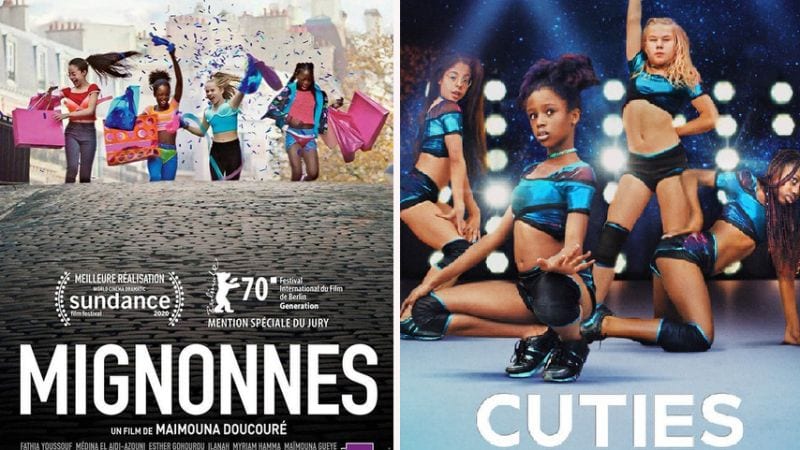Netflix’s Marketing Suggestions Are Not “Cute”
September 14, 2020
Netflix, the staple streaming giant for many who are cooped up at home with an abundant amount of free time, has faced loads of backlash in recent months. While Netflix has provided viewers with many loved and critically acclaimed series and films, one can’t help but discuss Netflix’s creative approach when it comes to adding and removing new content.
By looking at the recent creative approach Netflix has taken to adapt the “Avatar: The Last Airbender” series and their response to the divisive reactions brought upon by their addition of the controversial French film “Cuties,” it is clear to see that Netflix is facing major setbacks when it comes to appealing to the vast majority of their audience.
Netflix has a reputation for “butchering” series when it comes to adapting already well-executed content and cutting others short. Shows such as “Anne with an E” were scraped together at the last minute, and other shows such as “The Society” and “I’m Not Okay With This” were discontinued altogether, demonstrating Netflix’s bumpy history when it comes to pleasing their audience with their self-produced content.
So, when it was announced in 2018 that Netflix wanted to produce a live-action adaptation of “Avatar: The Last Airbender,” the critically acclaimed 2005 animated Nickelodeon show, fans were skeptical. They remained hopeful when it was announced in early August of this year that the creators of the original show, Bryan Konietzko and Michael DiMartino, were going to be involved in the writing of the adaptation. They were supposed to serve as showrunners and executive producers, which further sparked fans’ interest, due to the hope that the beloved show would finally receive an adaptation that honors its storytelling, unlike the 2010 live-action film, which was widely negatively received due to a whitewashed cast and an offset tone.
However, further details reported that Netflix wanted to separate the animated show from the live-action by “maturing” ATLA with the involvement of romance, sex and blood. This led to Konietzko and DiMartino’s departure from Netflix’s adaptation. The creators made it clear to fans that the final product would not be something that they approved or intended to make.
This led fans to create a petition titled “Demand Cultural Representation and Age Appropriation in Netflix’s ATLA-Live Action Series,” which has gained over 35,000 signatures since its conception.
In an attempt to relate to older viewers, Netflix failed to meet the creative hopes of the original creators, which then caused the dissatisfaction of many fans. Similarly, Netflix viewers were also dissatisfied with Netflix’s approval of the movie “Cuties”.
The movie, originally titled “Mignonnes” but more commonly known as “Cuties” in the United States, received a great deal of backlash after Netflix released their own version of the movie’s poster without any context or description of the movie. This “revealing” image of young children did not sit well with many Netflix users.
Along with the poster, Netflix’s original description of the movie read, “Amy, 11, becomes fascinated with a twerking dance crew. Hoping to join them, she starts to explore her femininity, defying her family’s traditions.” When faced with extreme backlash, Netflix ultimately changed the statement from “twerking dance crew” to “free-spirited dance group.”
However, this description still resulted in the creation of many petitions calling for the removal of the movie even before its arrival. As the dust settled, Netflix responded on Twitter, essentially stating that the controversial poster was a mistake on their part and was not an accurate depiction of this movie, which had recently won a Sundance Award.
Despite Netflix’s attempt to better the situation, many saw the changing of the description and movie poster as an attempt to downplay the sexualization of these young girls. This essentially caused #CancelNetflix to start trending shortly after the movie’s release on Sept. 9.
The director of the movie, Maïmouna Doucouré, a black Senegalese woman, described the movie as a coming-of-age film that tackles her own experience with culture and tradition, while also discussing the effects of oversexualization in western society on young girls, which is aided by the significance placed on social media by today’s society.
“Cuties,” while enraging a vast majority of its audience, has also been used in an attempt to prove the QAnon conspiracy, a belief –– greatly supported by the far-right –– that Hollywood is controlled by a group of democratic pedophiles.
It is clear that the hypersexualization of young girls is a problem in our society today. At the same time, Doucouré’s approach, like that of many progressive movies, was an attempt to get a reaction from the audience and bring light to a taboo topic. The irony is that because the hypersexualization of girls is a direct problem within the film industry, the exact problem Doucouré was trying to solve was the one portrayed by the film.
The mass disagreement between Netflix and its audience pertaining to their recent decisions on the ATLA series and the movie “Cuties” has left its audience questioning their standing with the platform. All this backlash has led to various social and political discussions now leaving it up to Netflix to determine how they will address these problems.


